
Some WDFW Commissioners Push To OK Conservation Policy By Year End
The push and rush to implement a new conservation policy for the Washington Fish and Wildlife Commission and WDFW sooner rather than later was on raw display this morning.
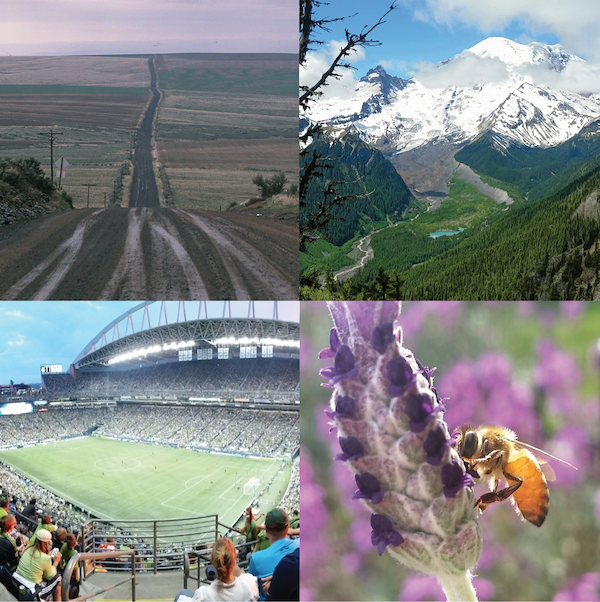
During a well-attended Big Tent Committee meeting, Commissioners Lorna Smith of Port Townsend and Melanie Rowland of Twisp demanded for it to be voted on in December, inquired about the legal ramifications of getting there, and Rowland termed a high-ranking agency staffer’s reasoned judgment that a decision point couldn’t actually be reached until late next spring “absolutely absurd.”
For Smith and Rowland, there’s simply no more time for talking about the controversial policy, given their perception of climate change and human development’s impact on the state’s natural environment and resources and the responsibility to address that, as well as how long has already been spent going over a policy now in its umpteenth draft.
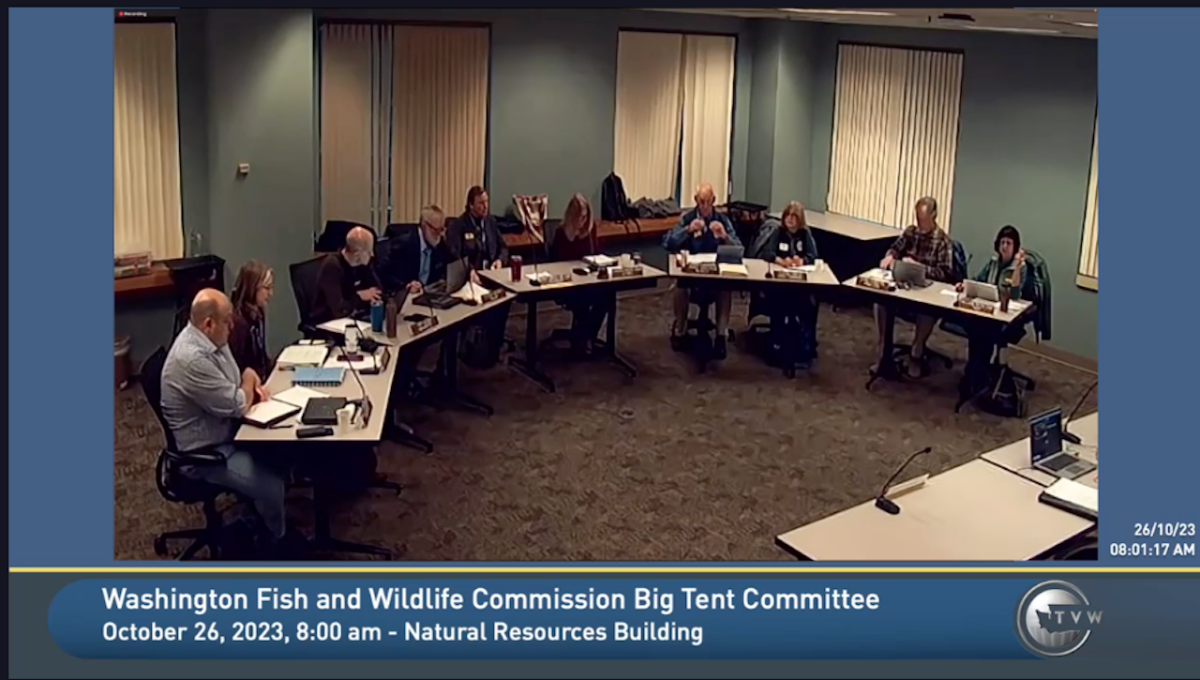
Smith allowed that continuing to wordsmith the controversial document’s definitions wouldn’t give her heartburn, but she said it was important to get the policy’s overarching principles in place as soon as possible.
“It’s been three years – three years – of trying to develop and adopt a conservation policy that will guide our future decisions in alignment with the 25-year (strategic) plan and other other plans we have, frankly – we’ve got recreation plans, etc.,” Smith said. “So this just confirms our commitment to conservation; that’s what this policy does. I think that after this meeting, we firm up a version that we’re going to send back out to the public, not asking them for comments, frankly – they can always submit comments, but I don’t think we open it up for an additional comment period. And we plan to get this done by the end of the year. That’s what I want to see.”
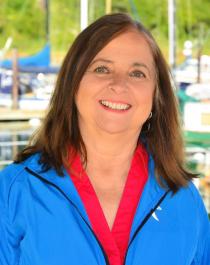
The conservation policy was actually first publicly unveiled two years ago, in September 2021. It was drafted by Chair Barbara Baker of Olympia, former Commissioner Fred Koontz of Duvall, former WDFW Director of Conservation Policy Jeff Davis and, as was revealed earlier this year, fish and wildlife agency reformist Ruth Musgrave before she became Governor Jay Inslee’s senior natural resources policy advisor.
WDFW already has a conservation policy, but this new one is also meant to define the word conservation, which is used dozens of times in WDFW’s 25-year strategic plan. Baker has described it as “overarching guidance to inform a variety of Department decisions relative to budget development, setting priorities, and the management of fish and wildlife. With a rapidly developing world and a changing climate, we need to be more responsive to these emerging issues and take a holistic approach to wildlife conservation.”
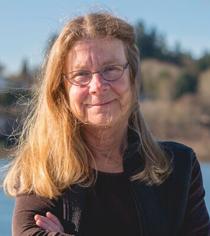
But its clubby authorship, fuzzy language – conservation first, precautionary principle, intrinsic value of nature, among others – offputting tone, nebulous purpose, out-of-the-blue timing and now this hard push to approve it by the end of the year has all raised red flags.
Smith and Rowland want to wave the checkered flag.
They did not welcome the path to an eventual vote in the middle of 2024 as recommended by Nate Pamplin, WDFW’s director of external affairs and someone who has worked for a number of tribes in the past.
He said it could begin with a redrafting with Baker next Tuesday, another Big Tent committee meeting in November or December, the subsequent draft being sent to tribes across the state and their comments being folded in by mid- to late January – with the possibility of a government-to-government meeting at some point – a recommended follow-up public comment period for hunters, anglers and others in late winter, and staff time to incorporate all of the input, all ultimately leading to a final decision by the commission next June.
And that was after, Pamplin said, he’d taken “to heart” Baker’s request to “shave” down the timeline.
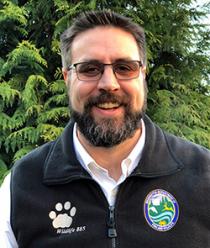
“When you think through those milestones and try not to – I understand it feels like a long time for some commissioners – think about how long it takes for the tribes to review it, how long it takes for a meaningful public comment period, and then factor in the time to review the draft before it goes to the next subsequent step,” Pamplin said, it’s just going to take awhile to complete and to respect everyone’s time and thoughts.
But Smith said she “will not agree to that approach,” and she questioned why WDFW hadn’t distributed the policy to the tribes for comment sooner.
“To find out in the 13th hour, frankly, the 20th hour, that we have not reached out to those other tribes that we need to, I gotta look to staff and say, we look to you for guidance on these things and I am really disappointed,” she said.
Baker broke in to say that Pamplin had actually provided staff direction to get the document out to the tribes a year ago but said “it didn’t happen.”
The commission did receive initial comments from the chair of the Northwest Indian Fisheries Commission this past June, but there are many other tribes around the state and they likely have input too on matters potentially affecting off-reservation fishing and hunting rights.
Smith also expressed frustration about the prospect of another round of public comment – the initial period occurred last April to June.
“This is just way, way overkill on a policy that doesn’t even suggest we’re going to do anything different than we’re doing right now,” Smith said.
Baker asked the commission’s lawyer, Joe Panesko of the Washington Attorney General’s Office, if there was another route for getting edits from the full commission back to the committee and whether that would violate the Open Public Meetings Act. Panesko said he’d prefer to answer that question “offline because that is getting into legal risk analysis” that might or might not come back to bite the commission and WDFW in the form of litigation.
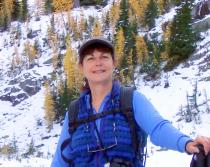
With Panesko handy, Rowland asked, “Is there any significant legal risk that you see for us to vote on this in December and adopt it if we do not take further public comment?”
Panesko indicated that that question was also best addressed offline – meaning, during the periodic closed-door executive sessions the commission and agency staff hold on legal, employment and other matters.
Rowland doubled down – and then some.
“I think this is a perfect example of why I have been on this commission for very close to two years and Nate is now saying that under his suggested timeline, this conservation policy, which had already been under discussion for a year before I ever got on the commission, and now he says, well, maybe we could vote on it in June. This is absurd. It is absolutely absurd,” Rowland stated. “This agency cannot govern what it needs to govern by taking so long to do everything. We don’t have that time. We simply don’t have that time. And I don’t know how to get this across to people, but I’m totally with Lorna (Smith). This has to be adopted by the end of the year.”
Rowland calling Pamplin’s counsel “absurd” in a public forum was reminiscent of her attacks on WDFW Wolf Policy Manager Julia Smith and Director Kelly Susewind in spring 2022, and like Smith and Susewind, Pamplin tactfully pushed back.
“I did provide professional recommendations on doing engagement on this policy much earlier and I’m doing it again. And I’m being told by a commissioner that my recommendation is absurd, and all I can do is offer recommendations. And I understand that that’s your all’s decision, but please don’t discount my completed staff work. Thank you,” Pamplin said.
How long can this go on?
Discounting staff work, unfortunately, has become a theme with some members of this commission, and today’s push to get the conservation policy in place asap does nothing but cement the feeling that something else is up with this policy, to its detriment.
It wasn’t all fire and drama this morning; there were constructive edits too.
Earlier in the meeting, Commissioner John Lehmkuhl of Wenatchee stated, “I think we need to convey the fact that conservation requires many different sorts of approaches and some of them – and this is perhaps what’s was missing in the original – is that management, we do have to, in some ways, manage habitats, manage ecosystems for conservation purposes. And I think that’s what people were concerned about; they didn’t see the word managing, which, you know, encompasses what (for) some people (is) their concept of conservation. We do a lot of management, we do restoration, we do all kinds of things, so I think that needs to be mentioned.”
Vice Chair Molly Linville of Douglas County lauded the discussion commissioners were having around concepts in the draft.
“I feel as though this is a great conversation. I’m feeling very comfortable at this table right now, having this conversation. And I would suggest that if we want folks to trust us, this is where we should be having these conversations, even if it takes us longer, and it’s harder, and sometimes very uncomfortable,” Linville said.
And Commissioner Jim Anderson of Buckley said he appreciated Commissioner Smith’s contention that the new policy wasn’t about taking away hunting and fishing.
“But I think we can go further than that by articulating in the policy that we respect the use of the resource, the species … To me, conservation is more than just this statement. It’s more than the biology. It’s also about the human aspect of ourselves and how we interact with the fish and wildlife and our resources. And so … we need to fully articulate about how we try to describe this, and I think we need to not short change our talk of the mandate,” Anderson said.
And that is going to have to be all the time I have for this barrel of fun.

